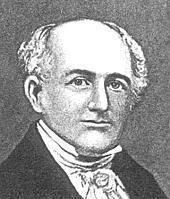Planning worship?
Check out our sister site, ZeteoSearch.org,
for 20+ additional resources related to your search.
- |
User Links
Search Results
Come, all ye saints, who love the Lord
Author: Abner Kneeland Appears in 3 hymnals
Come, all ye saints, who love the Lord
Come, all ye saints, who love the Lord
Author: Kneeland Hymnal: Hymns, Composed by Different Authors, at the Request of the General Convention of Universalists. 2nd ed. #a248 (1810) Languages: English
Come, all ye saints, who love the Lord
Come, all ye saints, who love the Lord
Author: Kneeland Hymnal: Hymns #248 (1808) Languages: English
Come, all ye saints, who love the Lord
Come, all ye saints, who love the Lord
Author: Kneeland Hymnal: The Philadelphia Hymn Book; or, a selection of sacred poetry, consisting of psalms and hymns from Watts...and others, adapted to public and private devotion #623 (1819)
Come, all ye saints, who love the Lord
Abner Kneeland

1774 - 1844 Author of "Come, all ye saints, who love the Lord" Kneeland, Abner, born in 1774, was noted for his religious changes, most of which may be traced through his hymns. He contributed 147 pieces to the American Universalist's Hymns composed by different Authors, 1808; and also edited The Philadelphia Hymn Book, 1819, and Hymns for the Use of those who are Slaves to no Sect, in 1834. In 1836 he underwent a trial at Boston for blasphemy. He died in 1844.
--John Julian, Dictionary of Hymnology, Appendix, Part II (190
==============================
Kneeland, Rev. Abner. (Iowa, 1774--1844, Salubria, Iowa). A Universalist miniter, one of the editors of the collection Hymns composed by different Authors, by order of the General Convention of Universalists of the New England States, 1808, to which he contributed 138 hymns, of poor quality. He resigned from the Universalist ministry in 1829 and became lecturer to a society of Freethinkers in Boston, and began publication of a periodical called the Investigator. In 1833 he was indicted on a charge of blasphemy and served a prison sentence. On his release he returned to Iowa, then a territory, and established a free-thinking colony which he called Salubria. His hymn beginning "Mediator, Son of God" is included in Church Harmonies: New and Old, 1895.
--Henry Wilder Foote, DNAH Archives
Abner Kneeland


 My Starred Hymns
My Starred Hymns


